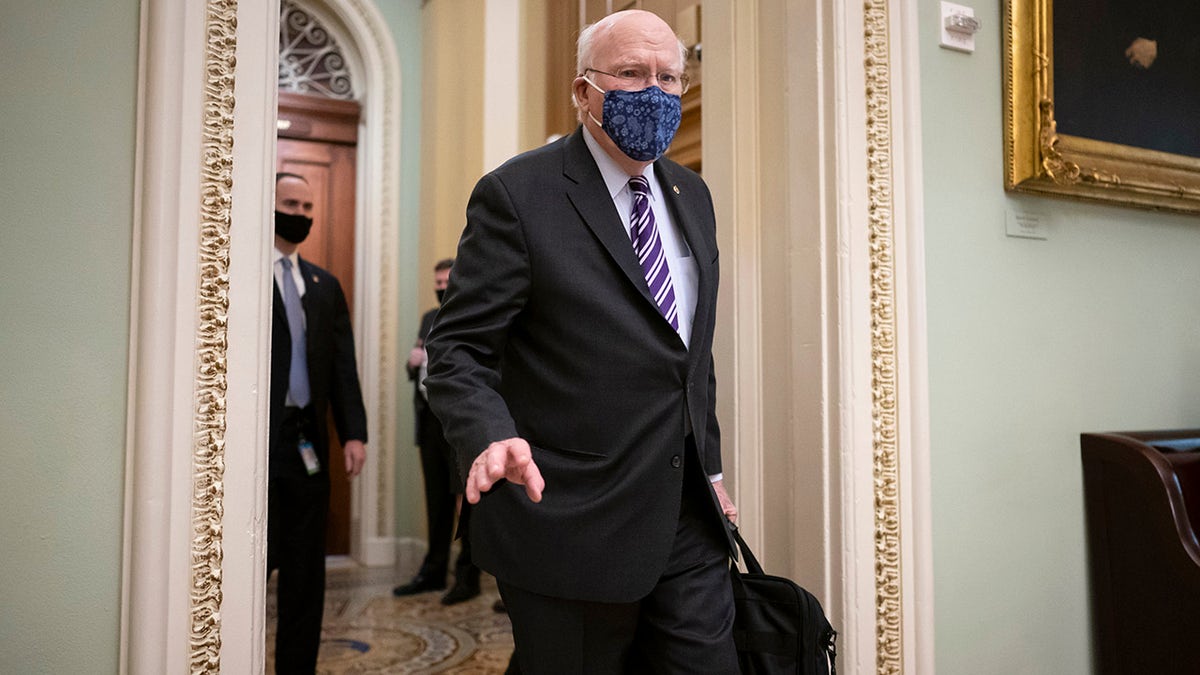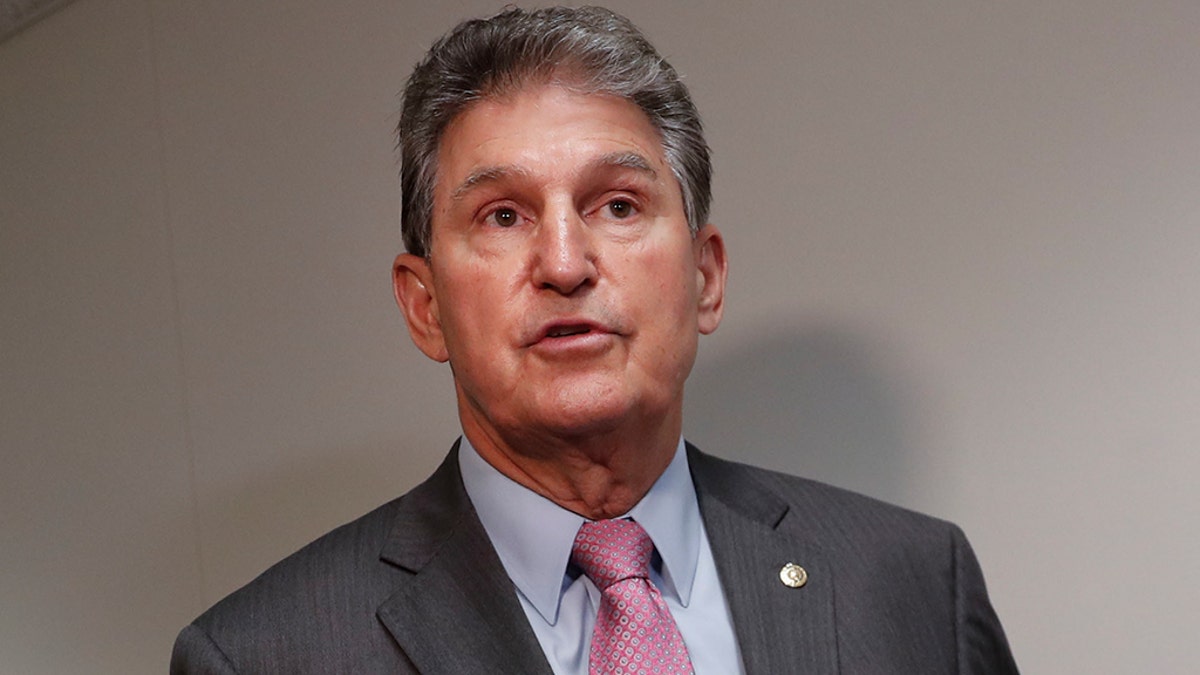Dems getting rid of filibuster would 'change everything on Capitol Hill': Bream
Fox News host Shannon Bream responds to the Dems' Supreme Court expansion conference, and argues they're petitioning for a policy that'll affect other legislation.
A bill introduced Thursday by a handful of liberal Democrats to pack the Supreme Court is likely to put pressure on moderate Democrats who aren't on board with it, leaving them caught in a tug of war between Republicans and their party's left wing.
Democrats like West Virginia Sen. Joe Manchin, Maine Rep. Jared Golden, California Sen. Dianne Feinstein, Arizona Sen. Kyrsten Sinema and New Jersey Rep. Josh Gottheimer may be some of the unlucky ones in the spotlight. They're set to face intense pressure as the court-packing bill's proponents push hard for its passage and Republicans use the issue as a cudgel in the midterms.
"This is such a fantastic gift to the NRSC," former National Republican Senatorial Committee (NRSC) staffer Matth Whitlock said on Twitter. "And making it a bill instead of a Senate rules process means we get to get moderate House D's on the record on it too. Just a fantastic turn of events."

U.S. Sen. Dianne Feinstein (D-CA) wears a protective mask while speaking to reporters at the U.S. Capitol on December 11, 2020 in Washington, DC. Feinstein has said that she would prefer if the legislative filibuster in the Senate remains in place. (Stefani Reynolds/Getty Images)
Conservative Fox News commentator Guy Benson also said, "I want to see floor votes on Democrats’ outrageous SCOTUS packing bill."
House Speaker Nancy Pelosi, D-Calif., already appears to be taking a step to protect her moderate members from being forced on the record on the court-packing bill.
"No," she said when asked if she supports the court-packing bill. She said she has "no plans to bring it to the floor." Pelosi also said she instead supports President Biden's executive order to study court packing.
But nevertheless more left-wing Democrats are likely to pressure moderates in their party to move quickly on the bill, which would increase the number of justices on the Supreme Court from nine to 13.
"The damage has already been done. We don't need a commission to tells us that we need to restore balance to the court in order to... save our democracy," Rep. Mondaire Jones, D-N.Y., said at a press conference introducing the bill Friday. He is one of the co-sponsors of the bill along with House Judiciary Committee Chairman Rep. Jerrold Nadler, D-N.Y., Rep. Hank Johnson, D-Ga., and Sen. Ed Markey, D-Mass.
"My view is that we are in a historic situation where this court is a six-three court because of illegitimate actions taken by a Republican United States Senate and a Republican president," Markey said at the same event. "We begin this discussion today but it does not end here and I believe that ultimately it's going to be very clear that this legislation has to pass."
"Speaker Pelosi is a very good judge of events and of history," Nadler added. "I believe that as events unfold, as the court comes down with decisions destructive to a woman's right to choose as they come down with decisions destructive to the climate ... I believe that Speaker Pelosi and others will come along."
The key votes if the court-packing bill were to pass will be moderate and institutionalist Democrats in the House and Senate. Democrats have razor-thin margins in each chamber, so they would be able to afford few if any defections.
Democratic members of the Problem Solvers Caucus in the House, for example, would be key votes in any effort to pass the court-packing plan.
Fox News reached out to the offices of two high-profile members of that group -- Golden and Gottheimer -- and did not immediately get responses to questions about the court-packing plan.
Meanwhile, in the Senate, many Democrats in the past have opposed packing the Supreme Court. Among them is Senate Judiciary Committee Chairman Patrick Leahy, D-Vt.

Sen. Patrick Leahy, D-Vt., the president pro tempore of the Senate, arrives at the Capitol in Washington, Tuesday, Jan. 26, 2021. Leahy, also the Senate Judiciary Committee chairman, said in 2017 that a Senate Judiciary Committee effort to prevent court-packing was a "proud moment." (AP Photo/J. Scott Applewhite) (AP)
In a 2017 statement, Leahy said "The Judiciary Committee once stood against a court-packing scheme that would have eroded judicial independence. That was a proud moment."
Leahy's office did not respond to a request for comment by Fox News on his colleagues' new court-packing plan.
With the GOP set to unanimously oppose the court-packing effort, Democrats would also need to get rid of the filibuster in the Senate for the bill to stand any chance of passing in the current Congress.
"We have to repeal the filibuster, and then we can move this legislation," Markey said, before applying apparent pressure on Pelosi. "They can move the legislation in the House of Representatives right now with the majority of the votes."
More than two-dozen Senate democrats in 2017 signed a letter opposing ending the filibuster. Most have distanced themselves from that position. But Manchin and Sinema continue to say they support the filibuster (Sinema was not in Congress in 2017 and therefore did not sign the letter).
Feinstein has not been as firm on the issue, but she continues to say she would prefer that the filibuster remains in place.

Sen. Joe Manchin, D-W.Va., speaks to members of the media prior to his meeting with CIA Director Nominee Gina Haspel, on Capitol Hill in Washington, Monday, May 7, 2018. Manchin has repeatedly said he opposes court packing and getting rid of the legislative filibuster in the Senate. (AP/File)
Representatives for Feinstein and Sinema did not respond to requests for comment asking about their thoughts on the court-packing bill.
"I think everyone knows I have not been in favor of expanding the court," Manchin said when asked about the bill.
Democrats in battleground states like Georgia could also be swing votes on court packing. Representatives for Sen. Jon Ossoff, D-Ga., did not return a request for comment on the court-packing bill.
Advocates of the court-packing bill are nevertheless optimistic that they will be able to build support for it.
There's "significant support" for the bill on the "Democratic side" of the House already, Johnson said. "But the issue has not been brought to the forefront," he added, implying that support could grow.
"Even the sponsors would agree it doesnt have the votes yet," Demand Justice Executive Director Brian Fallon tweeted. Fallon and Demand Justice are among the most vocal court-packing advocates on the left.
"The point in introducing the bill is to build support for it, a project that will only be aided by bad rulings from this 6-3 Court. Filibuster elimination didnt have the votes two years ago either," Fallon added.

Franklin Delano Roosevelt on June 1, 1928, smiling when he heard that he was leading the contest for Governor of New York State. When Roosevelt, as president, attempted to pack the Supreme Court, he was met with widespread opposition and the idea later died. (Photo by Hulton Archive/Getty Images)
Republicans, meanwhile, have torn into Democrats for supporting what would be a fundamental transformation of another branch of the government that hasn't been tried since former President Franklin Delano Roosevelt's attempt nearly 85 years ago.
"It's not just about whether this insane bill becomes law," Senate Minority Leader Mitch McConnell, R-Ky., said. "Part of the point here are the threats themselves. The left wants a sword dangling over the justices when they weigh the facts in every case."
President Biden earlier this week signed an executive order creating a commission with a mandate to study whether he should attempt to pack the court, among other potential reforms to the federal judiciary. McConnell at the time called the commission "an attempt to clothe" an attack on the Supreme Court in "fake legitimacy."
"But alas," McConnell said Thursday, "the far left cannot even wait for the fake theatrics of the fake study to play out. Today Democrats in the Senate and the House have announced that they will once again threaten judicial independence from the steps of the court."
Fox News' Jason Donner contributed to this report.






